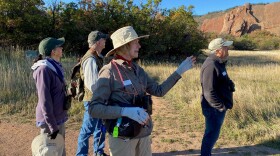-
As natural disasters strike the Mountain West, rural communities face some barriers to recovery. But they can’t always get their hands on climate resilience funding.
-
New data on natural disasters in the U.S. reveals that 2022 was one of the costliest and deadliest years on record.
-
Researchers have developed a snow and rain tracker that gathers data from citizen scientists in an effort to improve the accuracy of storm warnings and water management.
-
The National Audubon Society kicked off its annual bird count Wednesday — a program that helps experts understand how birds respond to climate change.
-
A Colorado professor is studying how plants grow under solar panels on rooftops. The research highlights the growing green roof movement — and the challenges cities face in mandating rooftop green space.
-
Many birds are in trouble nationwide. A 2019 study published by Cornell found that bird populations have declined 30% since 1970. That's nearly three billion birds.
-
The National Centers for Environmental Information released its national climate report for September, indicating that the month's national average temperature was 68.1 degrees Fahrenheit — the fifth warmest September in the 128-year record.
-
Last week, U.S. Secretary of Agriculture Tom Vilsack was in Denver to discuss significant federal funds coming to Colorado to support Climate-Smart Agriculture – an initial investment of $2.8 billion.With all that funding coming in, �ʹ���ַ’s Rae Solomon wanted to get the low down on what Climate-Smart Agriculture means. She did some digging, and recently sat down with All Things Considered host Beau Baker to share what she found.
-
“We're trying to make it easy for non-experts to find and use decision-relevant federal data to map and understand their exposure to climate-related hazards,” says Tom DiLiberto, a climate scientist at the NOAA Climate Program Office.
-
The Southwest Monsoon Fantasy Forecasts game has players predicting precipitation levels in five Southwest cities – and there's cash on the line.

Play Live Radio
Next Up:
0:00
0:00
Available On Air Stations










